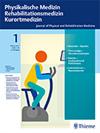The Effect of Pediatric Physiotherapy on Positional Plagiocephaly: A Retrospective Trial
IF 0.5
4区 医学
Q4 REHABILITATION
Physikalische Medizin Rehabilitationsmedizin Kurortmedizin
Pub Date : 2022-09-08
DOI:10.1055/a-1917-0677
引用次数: 0
Abstract
Objective Positional plagiocephaly represents one of the most common asymmetries in infancy with increasing incidence in the last three decades. Therapeutic options are numerous. Therefore the comparison of physiotherapeutic approaches according to Bobath concept versus Vojta principle for correction of positional plagiocephaly gives an inside view. Material and Methods Cranial vault asymmetry index (CVAI) and ear shift at a mean age of 3/6/9 months of 189 infants with positional plagiocephaly were measured by three-dimensional scans. The effectiveness was determined and compared based on CVAI and ear shift. The correlation of severity was calculated. Results The relative probability of success was 84% higher for Vojta compared to Bobath. Mean change of CVAI revealed a significantly greater reduction for infants treated with Vojta, as well as for ear shift. Improvement occurred especially from age of 6–9 months. Treatment duration was significantly shorter with Vojta and severe cases of positional plagiocephaly benefited significantly more. Conclusion Comparing the effectiveness of both physiotherapeutic treatment concepts on a neurophysiological basis according to Bobath and Vojta the presented retrospective data analysis provides statistically superior results in reducing skull asymmetry more effectively and faster in favor to the Vojta principle. Physiotherapy should be applied independent from severity and is effective for children older than 5–6 months.小儿物理疗法治疗位置性脑鼠疫的疗效:一项回顾性试验
目的定位斜头是婴儿最常见的不对称之一,近三十年来发病率不断上升。治疗方法有很多。因此,根据Bobath概念和Vojta原理对体位性斜头畸形的物理治疗方法进行比较,给出了一个内部视图。材料与方法采用三维扫描测量189例平均年龄3/6/9月龄斜头畸形患儿的颅顶不对称指数(CVAI)和耳移。在CVAI和耳移的基础上,确定并比较了其有效性。计算严重程度的相关性。结果Vojta的相对成功率比Bobath高84%。CVAI的平均变化显示,接受Vojta治疗的婴儿以及耳部移位的婴儿CVAI显著降低。改善尤其发生在6-9个月大时。Vojta治疗时间明显缩短,重度斜头位患者获益明显更多。结论通过对比Bobath和Vojta两种物理治疗理念在神经生理学基础上的疗效,回顾性数据分析显示,Vojta原则在更有效、更快地减少颅骨不对称方面具有统计学上的优势。物理治疗应独立于严重程度,对大于5-6个月的儿童有效。
本文章由计算机程序翻译,如有差异,请以英文原文为准。
求助全文
约1分钟内获得全文
求助全文
来源期刊
CiteScore
1.10
自引率
25.00%
发文量
70
审稿时长
3 months
期刊介绍:
The Journal of Physical and Rehabilitation Medicine offers you the most up-to-date information about physical medicine in clinic and practice, as well as interdisciplinary information about rehabilitation medicine and spa medicine.
Publishing 6 issues a year, the journal includes selected original research articles and reviews as well as guidelines and summaries of the latest research findings. The journal also publishes society news and editorial material. “Online first” publication ensures rapid dissemination of knowledge.

 求助内容:
求助内容: 应助结果提醒方式:
应助结果提醒方式:


